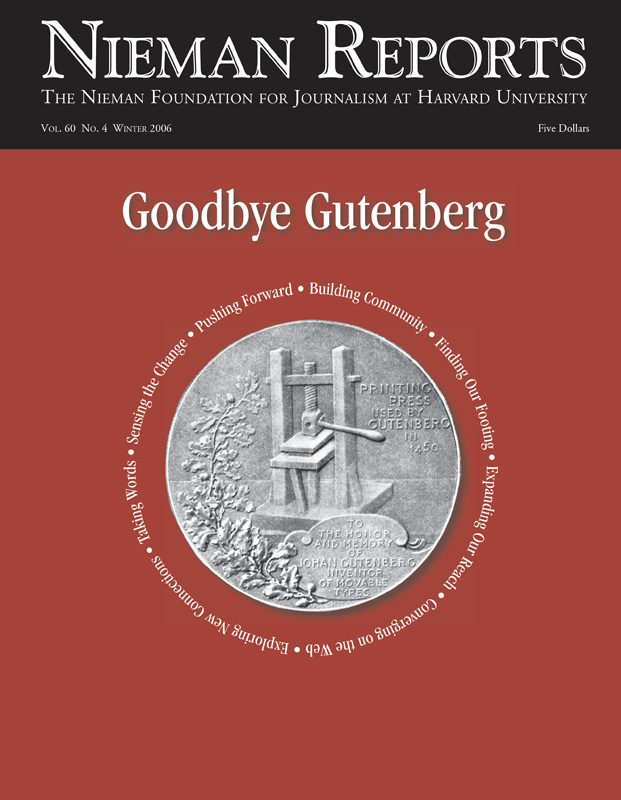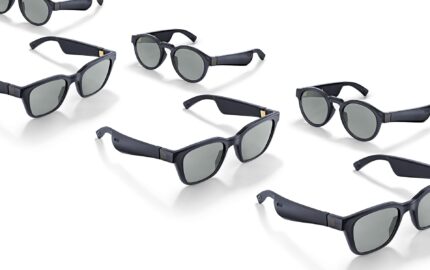
Goodbye Gutenberg
Journalism is on a fast-paced, transformative journey, its destination still unknown. That the Web and other media technologies are affecting mightily the practice of journalism is beyond dispute. Less clear is any shared vision of what the future holds.
In this issue, words about journalists' experiences in the digital era transport our vision forward, while our eye takes us on a visual voyage back to a time when newspapers wove communities together.
Our newspaper's digital journey started off as a rather old-style conversation. In the spring of 2005, we were thinking about ways to attract new readers and came up with the idea of launching a Monday business section in the Portland (Maine) Press Herald. But as we thought more and more about doing this, it didn't seem the right approach.
Instead, two of our paper's senior editors, Jeannine Guttman and Eric Conrad, suggested we move in a completely new direction. That's when I was asked to develop a Monday "interactive section" of our newspaper. In researching how this might be done, I came across a wide range of innovative newspaper/online initiatives. In absorbing them, a thought came to me: Nearly all of the convergence strategies I was reading about involved print journalists producing content for the Web and using the newspaper itself to promote the really cool things that readers could do online.
I started to wonder about whether we couldn't reverse this process by having the Web bring something to the newspaper. I'd run into a few examples of reverse publishing, in which comments made online found their way into print. But such examples were rare and scattered and, when they did occur, they did not seem integrated into the print newspaper in any meaningful way.
With this concept in mind, we set out to create a weekly section that would seek to bridge the divide between what's in the newspaper and what's on the RELATED WEB LINK
iHerald
– www.mainetoday.comWeb. "iHerald" launched on September 19, 2005. The "i" stood in for a few important "i" words—interactivity, the individual, and the Internet. We hoped to create a conversation and, as part of that conversation and to the extent possible, we wanted to let readers collaborate in the production of each week's iHerald section, which in the Monday paper would be a hybrid of citizen journalism and professionally produced content.
We also tried to create a loop between our online site, MaineToday.com, and the iHerald. For example, online visitors post comments about newspaper stories at MaineToday and some of them are published in the newspaper after names and towns of residence are confirmed. And their comments can be used as a springboard for stories or columns in the newspaper. Then, in turn, those stories are published online and comments on them are encouraged, and this creates an interactive loop.
How iHerald Works
In one way or another, readers suggest most iHerald stories. The Monday section from last March offers a good example. Our featured story arrived as a suggestion from a reader who knew college students participating in an alternative spring break in which they used vacation to help distressed people, such as those in the Gulf Coast disaster area. We produced a staff-written story and married it to a first-person essay by someone who'd gone south and could describe the plight of pets that hurricane evacuees left behind. A graphic artist on our staff incorporated pictures taken by those who'd participated in these projects into an illustration. We also included a column by one of our readers who wrote about another young Maine relief worker who had died in a Gulf Coast bus crash.
In a different iHerald, the state's middle-school laptop program became the focus. A staff writer contributed a traditional newspaper story describing how the program was doing and quoted experts about its future prospects. With it, we published companion essays by middle-school students writing about their experiences with the laptops; these were quite candid reflections about what worked for them educationally and also about how the computers were sometimes being misused. The combination of stories generated online discussion, and this was then reverse published into the newspaper to provide another forum for this debate. Schools hung the section on bulletin boards and discussed the topic in class.
iHerald is unusual in the extent to which we're able to create content across our print and Web-based platforms. In print, we regularly publish a column by an online producer who ruminates on a particular topic and also shares people's remarks about that topic from their online posts at MaineToday. We've experimented with having a newspaper staff writer produce first-person online-only essays that relate to the week's featured topic. When we published a package of stories about people no longer wanting their tattoos, our staff writer, Giselle Goodman, shared with readers her regret about getting a certain tattoo.
In another effort to connect our print and online platforms, we regularly list in iHerald what stories were most popular at MaineToday during the previous week in terms of page views. A library researcher at the Press Herald also puts on our site a feature about what interesting Web sites people can visit. And we write a mini-profile of someone in the community who offers their favorite online sites.
Techniques we use in iHerald can be used by other newspapers. And other sections of our own newspaper are starting to borrow some of what we do. Our opinion pages, for example, recently began reverse publishing some comments posted online along with traditional Letters to the Editor. This can certainly be used by a sports section to get some citizen-generated content onto its pages. A feature story could be accompanied by first-person accounts and reader-generated opinions. News coverage can be enhanced by meshing a traditional article with what readers have to say about issues of public concern and controversy.
Producing the Monday iHerald section is labor intensive. We need to confirm the identity of individuals posting anonymous messages online to use their content in the newspaper. And the involvement of citizen reporters, along with our staff, requires more planning and oversight than would be required for a traditional section of the paper. It also continues to be a challenge just to describe the mission of the Monday section since it is focused on the technique of interactivity rather than a topic such as business or sports. This is a new way for journalists to think about what appears on the pages of their newspaper.
This has been a valuable experiment in helping our newspaper evolve to meet the new digital demands, and the recognition it has received is gratifying. iHerald was named the 2006 winner of the New England Newspaper Association Reader First award, which "honors a newspaper for improved products and/or relationships with customers and readership growth and is designed to increase readership and innovation in the industry." It also was named this year as a notable entry in the Knight-Batten Awards for Innovations in Journalism that recognize organizations that "spotlight the creative use of new information ideas and technologies to involve citizens in public issues."
From our focus groups, it's clear that younger readers are more comfortable with a fluid content mix than older people. The younger readers appreciate having the chance to contribute directly to the section. Our initial strategy was to try doing this as a way to bring younger readers to our newspaper's pages more often. One indication that we are having some success is that schools in the Newspapers in Education program are asking for more copies of the Monday newspaper because students want the iHerald.
While newspapers are right to be exploring all sorts of strategies through experimentation on the Web, I also hope that newspaper sections such as iHerald demonstrate the potential for innovation to flow both ways.
Eric Blom is acting features editor of the Portland Press Herald/Maine Sunday Telegram. He also has worked as business editor, city editor, and staff writer at the paper.
Instead, two of our paper's senior editors, Jeannine Guttman and Eric Conrad, suggested we move in a completely new direction. That's when I was asked to develop a Monday "interactive section" of our newspaper. In researching how this might be done, I came across a wide range of innovative newspaper/online initiatives. In absorbing them, a thought came to me: Nearly all of the convergence strategies I was reading about involved print journalists producing content for the Web and using the newspaper itself to promote the really cool things that readers could do online.
I started to wonder about whether we couldn't reverse this process by having the Web bring something to the newspaper. I'd run into a few examples of reverse publishing, in which comments made online found their way into print. But such examples were rare and scattered and, when they did occur, they did not seem integrated into the print newspaper in any meaningful way.
With this concept in mind, we set out to create a weekly section that would seek to bridge the divide between what's in the newspaper and what's on the RELATED WEB LINK
iHerald
– www.mainetoday.comWeb. "iHerald" launched on September 19, 2005. The "i" stood in for a few important "i" words—interactivity, the individual, and the Internet. We hoped to create a conversation and, as part of that conversation and to the extent possible, we wanted to let readers collaborate in the production of each week's iHerald section, which in the Monday paper would be a hybrid of citizen journalism and professionally produced content.
We also tried to create a loop between our online site, MaineToday.com, and the iHerald. For example, online visitors post comments about newspaper stories at MaineToday and some of them are published in the newspaper after names and towns of residence are confirmed. And their comments can be used as a springboard for stories or columns in the newspaper. Then, in turn, those stories are published online and comments on them are encouraged, and this creates an interactive loop.
How iHerald Works
In one way or another, readers suggest most iHerald stories. The Monday section from last March offers a good example. Our featured story arrived as a suggestion from a reader who knew college students participating in an alternative spring break in which they used vacation to help distressed people, such as those in the Gulf Coast disaster area. We produced a staff-written story and married it to a first-person essay by someone who'd gone south and could describe the plight of pets that hurricane evacuees left behind. A graphic artist on our staff incorporated pictures taken by those who'd participated in these projects into an illustration. We also included a column by one of our readers who wrote about another young Maine relief worker who had died in a Gulf Coast bus crash.
In a different iHerald, the state's middle-school laptop program became the focus. A staff writer contributed a traditional newspaper story describing how the program was doing and quoted experts about its future prospects. With it, we published companion essays by middle-school students writing about their experiences with the laptops; these were quite candid reflections about what worked for them educationally and also about how the computers were sometimes being misused. The combination of stories generated online discussion, and this was then reverse published into the newspaper to provide another forum for this debate. Schools hung the section on bulletin boards and discussed the topic in class.
iHerald is unusual in the extent to which we're able to create content across our print and Web-based platforms. In print, we regularly publish a column by an online producer who ruminates on a particular topic and also shares people's remarks about that topic from their online posts at MaineToday. We've experimented with having a newspaper staff writer produce first-person online-only essays that relate to the week's featured topic. When we published a package of stories about people no longer wanting their tattoos, our staff writer, Giselle Goodman, shared with readers her regret about getting a certain tattoo.
In another effort to connect our print and online platforms, we regularly list in iHerald what stories were most popular at MaineToday during the previous week in terms of page views. A library researcher at the Press Herald also puts on our site a feature about what interesting Web sites people can visit. And we write a mini-profile of someone in the community who offers their favorite online sites.
Techniques we use in iHerald can be used by other newspapers. And other sections of our own newspaper are starting to borrow some of what we do. Our opinion pages, for example, recently began reverse publishing some comments posted online along with traditional Letters to the Editor. This can certainly be used by a sports section to get some citizen-generated content onto its pages. A feature story could be accompanied by first-person accounts and reader-generated opinions. News coverage can be enhanced by meshing a traditional article with what readers have to say about issues of public concern and controversy.
Producing the Monday iHerald section is labor intensive. We need to confirm the identity of individuals posting anonymous messages online to use their content in the newspaper. And the involvement of citizen reporters, along with our staff, requires more planning and oversight than would be required for a traditional section of the paper. It also continues to be a challenge just to describe the mission of the Monday section since it is focused on the technique of interactivity rather than a topic such as business or sports. This is a new way for journalists to think about what appears on the pages of their newspaper.
This has been a valuable experiment in helping our newspaper evolve to meet the new digital demands, and the recognition it has received is gratifying. iHerald was named the 2006 winner of the New England Newspaper Association Reader First award, which "honors a newspaper for improved products and/or relationships with customers and readership growth and is designed to increase readership and innovation in the industry." It also was named this year as a notable entry in the Knight-Batten Awards for Innovations in Journalism that recognize organizations that "spotlight the creative use of new information ideas and technologies to involve citizens in public issues."
From our focus groups, it's clear that younger readers are more comfortable with a fluid content mix than older people. The younger readers appreciate having the chance to contribute directly to the section. Our initial strategy was to try doing this as a way to bring younger readers to our newspaper's pages more often. One indication that we are having some success is that schools in the Newspapers in Education program are asking for more copies of the Monday newspaper because students want the iHerald.
While newspapers are right to be exploring all sorts of strategies through experimentation on the Web, I also hope that newspaper sections such as iHerald demonstrate the potential for innovation to flow both ways.
Eric Blom is acting features editor of the Portland Press Herald/Maine Sunday Telegram. He also has worked as business editor, city editor, and staff writer at the paper.


